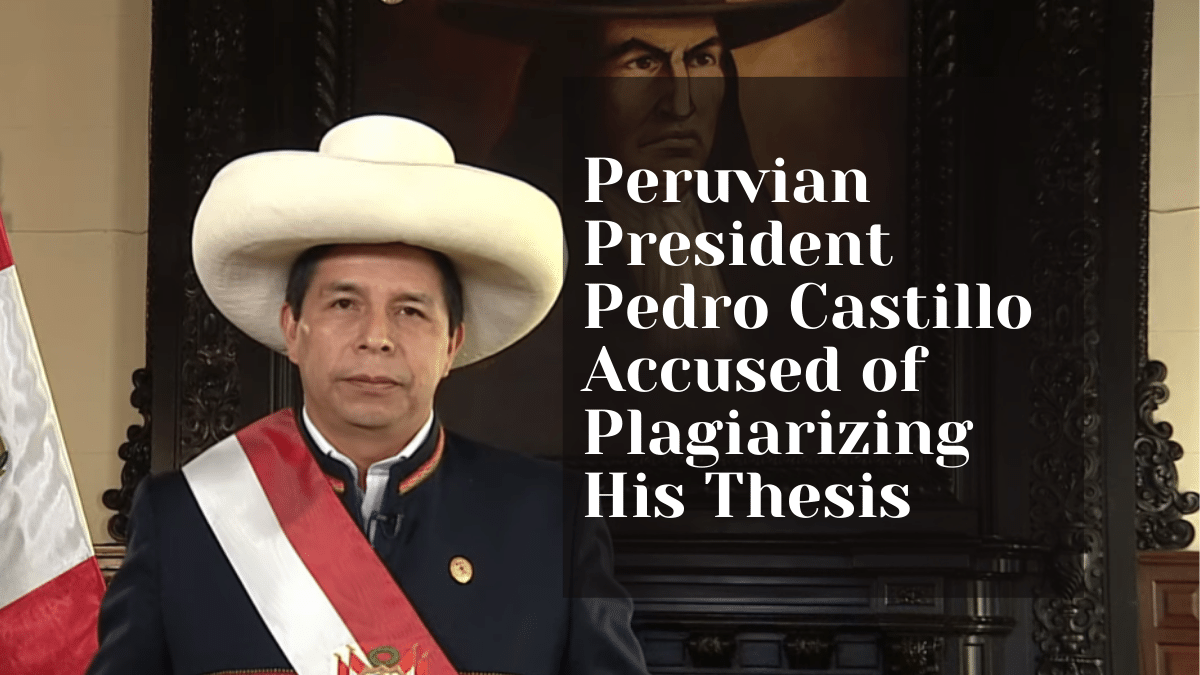Peru’s President Accused of Plagiarism in Thesis
Update: According to a May 5 report in The Guardian, Preuvian prosecutors have begun an investigation in the plagiarism allegations.
Peru’s President Pedro Castillo Terrones is facing allegations that he plagiarized over half of his master’s thesis, which he earned from César Vallejo University over a decade ago.
The allegations come from the TV show Panorama, which aired a report about the Thesis. It claimed that, when evaluated by plagiarism detection software, some 54% of the 121-page work came back as containing plagiarized text.
The thesis, which is titled, Gender equity and significant learning in the area of social personnel in students of the fourth cycle of the educational institution N° 10465 Puña, Tacabamba, Chota, contained a 26-page theoretical framework which, according to the report, was copied in its entirety.
Castillo, for his part, has strongly denied the allegations, saying that, “I have neither copied nor attributed authorship to third parties, as they irresponsibly pretend to make the population believe.”
Castillo has further expanded, saying that he feels the accusations have a “political tint” and is an attempt to destabilize his regime.
Nonetheless, César Vallejo University has assembled a committee to investigate the allegations and take whatever action they deem appropriate.
The case could be deeply impactful for Castillo. First, plagiarism is considered a criminal offense in Peru and, though penalties are usually light, it can carry a prison sentence of four to eight years.
This is not simply hypothetical. In 2009, local writer Alfredo Bryce Echenique was ordered to pay a fine for plagiarizing some 16 newspaper articles from 15 different authors.
Second, opposition leaders have already tried and failed twice to remove Castillo from office and at least one opposition lawmaker has already noted that “moral incapacity” constitutes grounds for impeachment in the country.
If it does turn out that the thesis is as plagiarized as indicated in the report, it could result in fresh legal challenges for Castillo as well as yet another challenge to his Presidency.
The Issue of Plagiarizing Politicians
When it comes to politicians accused of plagiarism, Castillo is in good company. We have seen similar stories involving national leaders in Germany, Hungary, Romania, Slovakia and more. Even the current President of the United States, Joe Biden, had to overcome allegations of plagiarism from his years in college.
Politicians and plagiarism seem to be a universal pairing regardless of country, political views and era.
The reason for this is straightforward. Politicians, in a bid to obtain higher offices, often seek out degrees that they either don’t want or don’t really need. In many nations, having a higher degree is a near-requirement for higher public office, this encourages many politicians to take a shortcut to the top.
When you couple this with relaxed plagiarism enforcement in many countries, it’s easy to see both why politicians commit plagiarism and how they often get away with it for decades. As we’ve seen in Romania, this can harm the local academic community and can take Herculean efforts to turn around.
But all this raises the question: What is next for Castillo? The answer is that it depends.
What’s Next for Castillo?
As we’ve seen in other political plagiarism stories, the outcome very likely depends on what the findings of the university are.
In February 2013, German Education Minister Annete Schavan faced accusations of plagiarism in her 1980 thesis. When her degree was rescinded, she resigned from the post.
Two years later, another German Minister, Ursula von der Leyen, was accused of plagiarism in her 1990 thesis. Her former university opted not to revoke her degree, and she is currently the President of the European Commission, the highest post in the European Union.
Though Germany and Peru are clearly different countries with different cultures, this has remained largely consistent in political plagiarism cases around the world. César Vallejo University will likely have the ultimate say here.
If they decide that the work was plagiarized and opt to revoke Castillo’s degree, Castillo will face a tough choice: Either resign or face significant challenges to his legitimacy as President.
However, it may be a long time before such a judgement is rendered. It’s not uncommon for such cases to take place over years, not weeks. Though every school and every case is different, I would not expect a swift response from the school, especially in such a high-profile case.
Bottom Line
Cases such as this are becoming all too familiar. An accusation of plagiarism is made, the allegations are strongly denied, and now we wait for the university to render its judgment on the matter.
However, Castillo’s situation may be unique among political plagiarism scandals. Between a strong opposition and a legal system that makes plagiarism a critical offense, it’s possible that the outcomes of this will not follow the traditional patterns.
In the end, this is going to be a story to watch as it unfolds. What happens from here will say a lot about Castillo, Peru and Peru’s education system when it comes to plagiarism.
Header Image: Presidencia de la República del Perú, CC BY 3.0, via Wikimedia Commons
Want to Reuse or Republish this Content?
If you want to feature this article in your site, classroom or elsewhere, just let us know! We usually grant permission within 24 hours.
